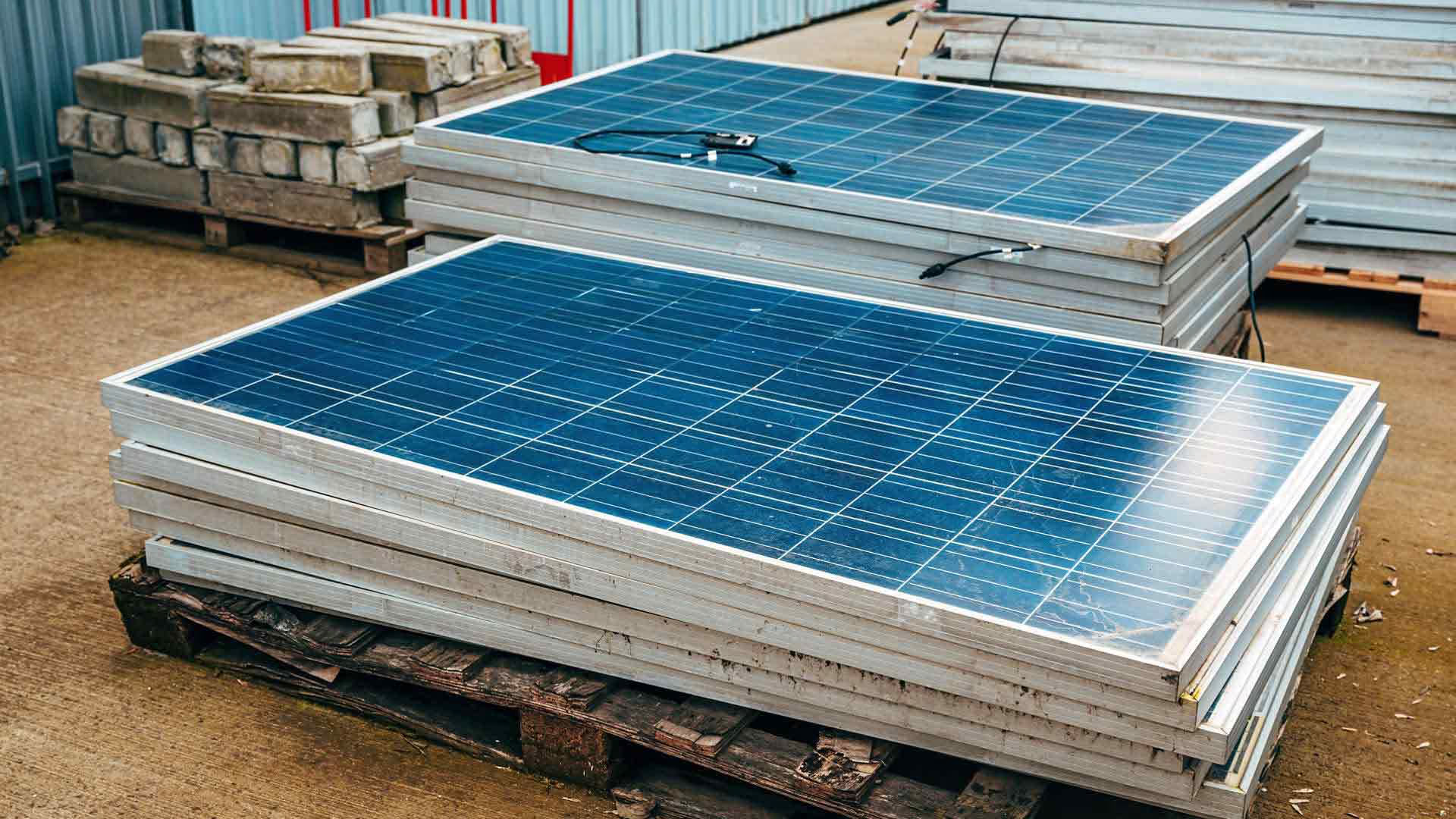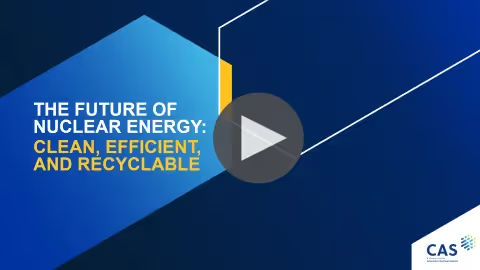CAS Insights
Sustainability
Filters

How to improve solar panel recycling
As solar panel usage increases, researchers are looking for new methods to tackle PV waste.
.avif)
Nuclear power in your pocket? 50-year battery innovation
Pocket-sized nuclear batteries are here. Discover their potential and limitations, from powering wearables to tackling radioactive waste.

Science fact vs. fiction: Can we recycle semiconductors?
Recycling semiconductors was once a far-off dream. However, new research and technology shows that this could become reality.

Four uses for renewable feedstock in sustainable coatings
With the push towards increased sustainability, here are four ways coatings manufacturers are making use of renewable feedstock for their own products.

Hydrogen needs cleaner production: Photocatalysis is the answer
Learn how photocatalysis can produce clean hydrogen from water and solar energy and why it is crucial for decarbonization.

Understanding the power of catalysis
Catalysts and catalysis have transformed our world, from ancient times to modern sustainability. Learn about the latest research trends and innovations.

Going green with plant-based meat sustainability
With consumers changing their diets for personal and health reasons, innovation to increase quality and variety creates a diverse and competitive market.

R&D insights: Sustainable catalysts for the future
Catalysts have been enabling green chemistry with applications in many industries.

Infographic: What can be done about microplastics?
Microplastics have infiltrated our entire world, even down to the water we drink and food we eat. Researchers are looking at new ways to address them.

Supercapacitor technologies: Is graphene finally living up to its full potential?
Graphene-based supercapacitor technologies are being levied for real-world applications as a battery alternative.

Five ways to achieve sustainable medical packaging
Learn five ways to reduce waste and use biodegradable materials to develop sustainable sterile packaging options for medical devices.

R&D Insights: Tiny microplastics with massive implications
Microplastic pollution is a global problem due to their disruption of ecosystems and their ingestion by humans and animals.

R&D Insights: Sustainable agriculture and fertilizer production
Agriculture and fertilizers have a sustainability problem. Understand emerging trends around reducing this industry's carbon emissions.
.avif)
New advances in recycling of lithium-ion batteries
Discover a new approach for direct recycling that could make it possible to repair and reuse depleted batteries at a lower cost.

Is nuclear energy critical in solving climate change?
Nuclear energy could play a part in solving climate change, but there are still hurdles and challenges that must be overcome.

Reduce, reuse, recycle: the path to sustainable agriculture
Explore the path to sustainable agriculture and learn about the key role it plays in global food production. Discover how reducing, reusing, and recycling can improve fertilizer access, minimize environmental impact and dependence on finite resources, and lead to a circular bioeconomy. Learn about the latest innovations in sustainable agriculture, including smart nano-fertilizers, biorefineries, and biochar, and see how they can be used to harness the nutrient content of waste products to bolster food production and protect the environment.

Hydrogen fuel-Insights into a growing market
Hydrogen fuel technology is being examined for powering electricity, heating, and transportation.

Scientific review on sustainable fertilizers
We analyze the scientific and patent trends on sustainable fertilizers in the CAS Content Collection to help scientists use new, more environmentally friendly sources.

Innovation in sustainable fertilizer production
Synthetic fertilizers ae valuable but leave a large carbon footprint. Sustainable fertilizers are an environmentally friendly alternative that is growing in interest.

Are we doing enough to solve the major issue of microplastics?
The WHO uncovered the scope of the microplastics problem. What can we do to correct this for future generations?

Scientific review on microplastics pollution
Methods to push back against the wave of microplastics that are poisoning the environment are in full swing.

Microplastics: Tackling the invisible enemy
Microplastics come from countless sources and have a large impact on the environment. Scientists are working hard to combat this growing problem.

Hidden greenhouse gas emissions in plant growth
Learn more about the hidden greenhouse gas emissions of plants, a more sustainable approach to fertilizer production, and new approaches to make phosphorus more recyclable.

Nuclear energy could be the key to cutting global emissions
Visual infographic of nuclear energy’s key benefits of an efficient fuel source, a low emissions option (compared to coal and natural gas) and new recycling efforts that minimize nuclear waste.

Green chemistry in the pharma industry: Sustainable pastures for those who innovate
One approach that has gained momentum since the 1990s is green chemistry, a scientific field focused on "the invention, design, and application of chemical products and processes to reduce or eliminate the use and generation of hazardous substances.

Bio-based Polymers: A Green Alternative to Traditional Plastics
With over 90% of the world’s plastics production requiring fossil fuels, bio-based polymers generated from renewable sources have substantial benefits over traditional plastics – from reducing CO2 emissions, increased biodegradability, and less dependence on fossil fuels. Learn more in our landscape

Lithium ion battery recycling
Learn more about the scientific challenges, emerging technologies, and the financial and environmental implications for recycling lithium ion batteries.

Combatting carbon emissions: Is carbon capture the answer?
This article summarizes the results of an extensive recent analysis of carbon dioxide capture, including research trends, methods employed, and storage.

Green hydrogen economy: game-changing technologies to transform the world’s energy supply
A literature search in the CAS Content Collection provides useful insights into recent and ongoing intensive research and development into green hydrogen.

A review of materials research for a green hydrogen economy
Many technologies have been researched with an eye toward enabling a hydrogen economy.

Bio-based polymers as an alternative to fossil fuel plastics
Most synthetic polymers are derived from fossil fuel resources, whose scarcity and imbalanced global distribution can affect plastics producers. Bio-based polymers, obtained from renewable biomass resources, have received wide attention in the past two decades.

How scientists are restoring carbon balance in the environment
While human capabilities have only increased due to recent technological and medical advances, they have significantly contributed to the release of around 830 gigatons of CO2 into the atmosphere in just the last 30 years alone.

Readdressing the balance: Exploring research trends in carbon dioxide sequestration
Learn more about carbon capture, storage, and reduction in our landscape view of this emerging research with unique insights.

The regulatory environment for lithium-ion battery recycling
Lithium-ion batteries (LIBs) are commonly used in a variety of consumer products, including cellular phones, laptop computers, and more recently, electric and hybrid vehicles.

Lithium-ion battery recycling: Overview of techniques and trends
As the production and usage of lithium-ion batteries (LIBs) has increased exponentially, their manufacturing and disposal have become subjects of political and environmental concerns.

Can plastic eating super-enzymes solve our destructive plastic problem?
An overview of research on how microbial enzymes can break down plastics, which could otherwise take hundreds of years to degrade.

Organizing vital data to unlock innovation from Brazil’s biodiversity
Brazil hosts 15-20% of Earth's biodiversity, yet much remains unexplored. Researchers struggle to search, screen, and compare chemical substances due to disorganized information.
No results found.
There are no results with this criteria. Try changing your search.
